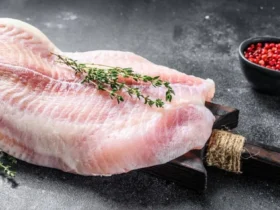Unwanted chin hair is a common concern for many women, often linked to hormonal imbalances, genetics, or underlying health conditions like PCOS (Polycystic Ovary Syndrome).
While medical treatments and hair removal methods can help, diet also plays a crucial role in managing excessive hair growth.
Eating the right foods and avoiding certain triggers can help balance hormones and reduce the appearance of unwanted facial hair.
Here’s a guide to the best foods to eat and avoid for controlling chin hair growth naturally.
Foods to Eat
1. Spearmint Tea
Spearmint tea is known to lower androgen levels (male hormones) in women, which helps reduce excessive hair growth. Drinking a cup of spearmint tea daily can aid in hormone balance.
2. Flaxseeds
Flaxseeds contain lignans and omega-3 fatty acids that help regulate hormonal imbalances. They reduce excess testosterone levels, helping to prevent unwanted hair growth.
3. Soy Products
Soy-based foods like tofu, soy milk, and edamame contain phytoestrogens that mimic estrogen and may help balance hormones naturally, reducing the growth of facial hair.
4. Cinnamon
Cinnamon helps regulate blood sugar levels and improve insulin sensitivity, which is beneficial for women with PCOS-related excessive hair growth.
5. Nuts and Seeds
Almonds, walnuts, and sunflower seeds provide essential nutrients like Vitamin E, zinc, and healthy fats, which support hormonal balance and reduce unwanted hair growth.
6. Leafy Greens
Spinach, kale, and other leafy greens contain essential vitamins and minerals, including iron and magnesium, which support proper hormone function and reduce facial hair growth.
7. Berries
Berries such as blueberries, strawberries, and raspberries are rich in antioxidants, which help lower inflammation and improve hormone balance.
8. Turmeric
Turmeric has anti-androgenic properties and can help reduce testosterone levels, which may decrease unwanted facial hair over time.
9. Chickpeas
Chickpeas are rich in phytoestrogens and fiber, which support hormonal health and help manage excessive hair growth.
10. Water
Staying hydrated is essential for detoxification and maintaining hormone balance, which can help prevent excessive hair growth.
Foods to Avoid
1. Processed Sugars
High sugar intake can spike insulin levels, leading to increased androgen production, which may trigger unwanted facial hair growth.
2. Dairy Products
Milk and dairy products may contain hormones that contribute to increased testosterone levels, worsening facial hair growth in some women.
3. Refined Carbohydrates
White bread, pasta, and processed snacks can cause blood sugar fluctuations, leading to hormonal imbalances that promote hair growth.
4. Red Meat
Red meat is rich in unhealthy fats that can increase inflammation and disrupt hormonal balance, contributing to excessive hair growth.
5. Fried and Fast Foods
Trans fats and processed oils in fried foods can lead to hormone imbalances and increased androgen levels, causing unwanted facial hair.
6. Caffeine and Alcohol
Excessive consumption of coffee and alcohol can disrupt liver function, which is responsible for detoxifying hormones. A sluggish liver may lead to hormone imbalances and excessive hair growth.
7. Soy-Based Junk Foods
While natural soy products are beneficial, processed soy foods like soy burgers and soy-based protein powders may contain additives that disrupt hormonal balance.
8. High-Glycemic Foods
Foods that cause rapid spikes in blood sugar, such as pastries, sugary cereals, and white rice, can increase androgen levels, leading to unwanted hair growth.
9. Artificial Sweeteners
Aspartame and other artificial sweeteners may contribute to hormonal imbalances that could affect facial hair growth.
10. Excess Salt
High sodium intake can affect adrenal function, leading to increased production of stress hormones that disrupt the hormonal system and trigger excessive hair growth.
Final Thoughts
While diet alone may not completely eliminate unwanted chin hair, incorporating the right foods and avoiding hormone-disrupting triggers can help balance your system and manage excessive growth naturally.
If excessive facial hair persists despite dietary changes, consulting a healthcare professional to check for underlying conditions like PCOS or hormonal imbalances is advisable.
By making mindful dietary choices, you can support your body’s natural hormone regulation and work towards clearer, smoother skin!


























 Afrikaans
Afrikaans Albanian
Albanian Amharic
Amharic Arabic
Arabic Armenian
Armenian Azerbaijani
Azerbaijani Basque
Basque Belarusian
Belarusian Bengali
Bengali Bosnian
Bosnian Bulgarian
Bulgarian Catalan
Catalan Cebuano
Cebuano Chichewa
Chichewa Chinese (Simplified)
Chinese (Simplified) Chinese (Traditional)
Chinese (Traditional) Corsican
Corsican Croatian
Croatian Czech
Czech Danish
Danish Dutch
Dutch English
English Esperanto
Esperanto Estonian
Estonian Filipino
Filipino Finnish
Finnish French
French Frisian
Frisian Galician
Galician Georgian
Georgian German
German Greek
Greek Gujarati
Gujarati Haitian Creole
Haitian Creole Hausa
Hausa Hawaiian
Hawaiian Hebrew
Hebrew Hindi
Hindi Hmong
Hmong Hungarian
Hungarian Icelandic
Icelandic Igbo
Igbo Indonesian
Indonesian Irish
Irish Italian
Italian Japanese
Japanese Javanese
Javanese Kannada
Kannada Kazakh
Kazakh Khmer
Khmer Korean
Korean Kurdish (Kurmanji)
Kurdish (Kurmanji) Kyrgyz
Kyrgyz Lao
Lao Latin
Latin Latvian
Latvian Lithuanian
Lithuanian Luxembourgish
Luxembourgish Macedonian
Macedonian Malagasy
Malagasy Malay
Malay Malayalam
Malayalam Maltese
Maltese Maori
Maori Marathi
Marathi Mongolian
Mongolian Myanmar (Burmese)
Myanmar (Burmese) Nepali
Nepali Norwegian
Norwegian Pashto
Pashto Persian
Persian Polish
Polish Portuguese
Portuguese Punjabi
Punjabi Romanian
Romanian Russian
Russian Samoan
Samoan Scottish Gaelic
Scottish Gaelic Serbian
Serbian Sesotho
Sesotho Shona
Shona Sindhi
Sindhi Sinhala
Sinhala Slovak
Slovak Slovenian
Slovenian Somali
Somali Spanish
Spanish Sundanese
Sundanese Swahili
Swahili Swedish
Swedish Tajik
Tajik Tamil
Tamil Telugu
Telugu Thai
Thai Turkish
Turkish Ukrainian
Ukrainian Urdu
Urdu Uzbek
Uzbek Vietnamese
Vietnamese Welsh
Welsh Xhosa
Xhosa Yiddish
Yiddish Yoruba
Yoruba Zulu
Zulu
1 Comment